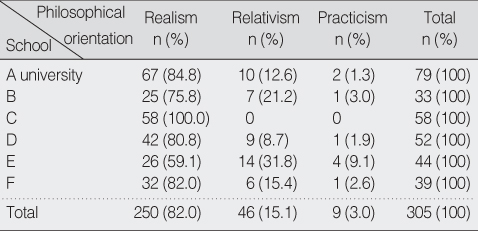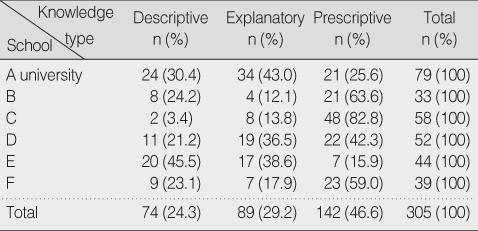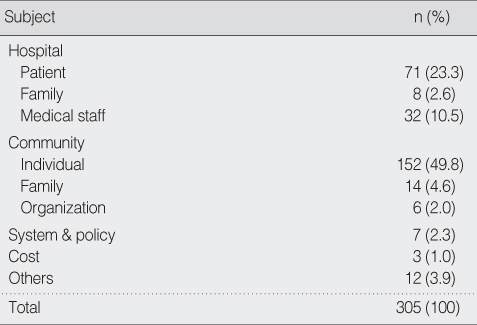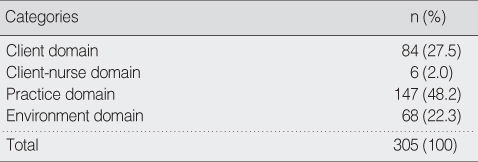Articles
- Page Path
- HOME > J Korean Acad Nurs > Volume 38(1); 2008 > Article
-
Original Article
- Trends of Doctoral Dissertations in Nursing Science: Focused on Studies Submitted Since 2000
- Hyunsook Shin, Kyung-Mi Sung, Seok Hee Jeong, Dae-Ran Kim
-
Journal of Korean Academy of Nursing 2008;38(1):74-82.
DOI: https://doi.org/10.4040/jkan.2008.38.1.74
Published online: February 29, 2008
1Assistant Professor, Collge of Nursing Science, Kyung Hee University, East-West Nursing Research Institute, Seoul, Korea.
2Part-time Instructor, College of Nursing, Ajou University, Suwon, Korea.
3Full-time Instructor, Seoul Women's College of Nursing, Seoul, Korea.
4Assistant Professor, College of Nursing, Keimyung University, Daegu, Korea.
- Address reprint requests to: Kim, Dae-Ran. College of Nursing, Keimyung University, 194 Dongsan-dong, Jung-gu, Daegu 700-712, Korea. Tel: 82-53-250-7513, Fax: 82-53-252-6614, drkim@kmu.ac.kr
Copyright © 2008 Korean Society of Nursing Science
Abstract
-
Purpose
- The purpose of this study was to identify the characteristics of doctoral dissertations in nursing science submitted since 2000.
-
Methods
- Three-hundred and five dissertations of six schools of nursing published from 2000 to 2006 in Korea were analyzed with the categories of philosophy, method, body of knowledge, research design, and nursing domain.
-
Results
- In philosophy, 82% of all dissertations were identified as scientific realism, 15% were relativism, and 3% were practicism. Two-hundred and fifty dissertations (82%) were divided into a quantitative methodology and 55 dissertations (18%) were qualitative methodology. Specifically, 45% were experimental, 23% methodological, 13% survey and 17% qualitative designed researches. Prescriptive knowledge was created in 47% of dissertations, explanatory knowledge in 29%, and descriptive knowledge in 24%. Over 50% of all research was studied with a community-based population. In the nursing domain, dissertations of the practice domain were highest (48.2%).
-
Conclusion
- Dissertations since 2000 were markedly different from the characteristics of the previous studies (1982-1999) in the increase of situation-related, prescriptive and community-based population studies. A picture of current nursing science identified in this study may provide a future guideline for the doctoral education for nursing.
- 1. Allen D, Benner P, Diekelmann NL. Chinn PL. Three paradigms for nursing research: Methodological implications. In: Nursing research methodology. 1986;Rockville, MD, Aspen. 23–38.
- 2. Appleton JV, King L. Journeying from the philosophical contemplation of constructivism to the methodological pragmatics of health service research. J Adv Nurs. 2002;40:641–648.PubMed
- 3. Barrett EM. What is nursing science? Nurs Sci Q. 2002;15(1):51–60.ArticlePubMedPDF
- 4. Chang SO. Analysis on articles published in Journal of Korean Academy of Nursing (volume 33, Number 6-number 34, numbar 5) based on nursing knowlege classifications. J Korean Acad Nurs. 2005;35:206–212.ArticlePDF
- 5. Colorado Nursing Think Tank. JAN forum: saving the discipline-top 10 unfinished issues to inform the nursing debate in the new millennium. J Adv Nurs. 2001;35:138. Article
- 6. DiBartolo MC. Philosophy of science in doctoral nursing education revisited. J Prof Nurs. 1998;14:350–360.ArticlePubMed
- 7. Donaldson SK, Crowley DM. The discipline of nursing. Nurs Outlook. 1978;26:113–120.PubMed
- 8. Fawcett J. The state of nursing science: hallmarks of the 20 th and 21st centuries. Nurs Sci Q. 1999;12:311–315.ArticlePubMedPDF
- 9. Ford-Gilboe M, Campbell J, Bermann H. Stories and numbers: co-existence without compromise. ANS. 1995;18(1):14–26.Article
- 10. Han KJ, Kim HA, Kim SY, Kim JS. An analysis of the concepts in child health nursing studies in Korea (1): from 1990 to 2000. Korean J Child Health Nurs. 2002;8:449–457.
- 11. Jacox A, Suppe F, Campbell J, Stashinko E. Hinshaw AS, Feetham SL, Shavert JLF. Diversity in philosophical approaches. In: Handbook of clinical nursing research. 1999;CA, Sage publications. 3–17.
- 12. Kim ES, Kim GS, Kim DR, Kim EJ, Sung KM, Shin HK, et al. Trends of nursing science inquiry in doctoral dissertations. J Korean Acad Nurs. 2004;34:315–323.ArticlePDF
- 13. Kim HS. Identifying alternative linkages among philosophy, theory and method in nursing science. J Adv Nurs. 1993;18:793–800.ArticlePubMed
- 14. Kim HS. The nature of theoretical thinking in nursing. 2000;2nd ed.New York, Springer Publishing.
- 15. Lee YJ, Kim DS. An analytical review on fatigue of cancer patients. J Korean Acad Nurs. 2002;32:897–905.ArticlePDF
- 16. Mitchell GJ. Abstractions and practiculars: learning theory for practice. Nurs Sci Q. 2003;16:310–314.ArticlePubMedPDF
- 17. Pesut B, Sawatzky R. To describe or prescribe: assumptions underlying a prescriptive nursing process approach to spiritual care. Nurs Inq. 2006;13:127–134.ArticlePubMed
- 18. Phillips JR. What constitutes nursing science? Nurs Sci Q. 1996;9(2):48–49.ArticlePubMedPDF
- 19. Shin KR. The development of Korean nursing alternative. J Korean Acad Nurs. 1999;29:1403–1428.ArticlePDF
- 20. Silva MC, Rothbart D. An analysis of changing trends in philosophies of science on nursing theory development and testing. ANS. 1984;6(2):1–13.Article
- 21. Spear HJ. Nursing theory and knowledge development: a descriptive review of doctoral dissertations, 2000-2004. ANS. 2007;30(1.
- 22. Weaver K, Olson JK. Understanding paradigms used for nursing research. J Adv Nurs. 2006;53:459–469.ArticlePubMed
REFERENCES
Figure & Data
REFERENCES
Citations

- Development support as education aid or labor trade? South Korean nurses in West Germany (1965–1976)
Jinyoung Yu, Jungwook Seo
Asia Europe Journal.2024; 22(2): 225. CrossRef - Nitel Araştırma ve Ruh Sağlığı ve Psikiyatri Hemşireliğinin Felsefi Boyutu ve Karakteristik Özellikleri
Mahire Olcay ÇAM, Ece MUTLU SATIL
Ordu Üniversitesi Hemşirelik Çalışmaları Dergisi.2021; 4(3): 436. CrossRef - Development and Analysis of System Dynamics Model for Predicting on the Effect of Patient Transfer Counseling with Nurses
Hye Min Byun, Eun Kyoung Yun
Journal of Korean Academy of Nursing.2018; 48(5): 554. CrossRef - A Historical Trends of Doctoral Nursing Education in Korea
Kasil Oh, Young Sook Park, Ja Hyung Lee, Kyong-Ok Oh, Yang Heui Ahn, Jiyoung Lim
The Journal of Korean Academic Society of Nursing Education.2014; 20(1): 93. CrossRef - Analysis of Trends and Contents of Nursing Doctoral Dissertations in Korea
Kwang-Ja Lee, Younhee Kang, Mee Ock Gu, Kyunghee Kim, Oksoo Kim, Yeon-Ok Suh, Eunyoung Suh, Soo Yang, Eun-Hyun Lee, Ja Hyung Lee, Myoung-Ae Choe, Yang Sook Hah
Journal of Korean Academy of Nursing.2012; 42(2): 302. CrossRef - Trends in Research on Caregivers Hospitalized Children in Korea-Focus on Knowledge Type
In-soo Kwon, Yeong-mi Seo, Ji-youn Kim
Journal of Korean Academy of Child Health Nursing.2012; 18(3): 101. CrossRef - Reviewing the trends of nursing doctoral thesis research in Hong Kong
Yingchun Zeng, Samantha Pang
Open Journal of Nursing.2012; 02(04): 346. CrossRef - Research Trends on Parent-Child Relationships from the Perspective of Nursing
Mi Ran Kim, Young Hee Park, Eun Sook Park
Journal of Korean Academy of Child Health Nursing.2010; 16(4): 249. CrossRef
Philosophical Orientation by School (N=305)
Knowledge Type by School (N=305)
Methodology by School (N=305)
Linkage of Philosophical Orientation, Knowledge Type, and Methodology (N=305)
Quan=Quantitative; Qual=Qualitative; Des=Descriptive knowledge; Exp=Explanatory knowledge; Pre=Prescriptive knowledge.
Research Subject (N=305)
Nursing Domain (N=305)
Quan=Quantitative; Qual=Qualitative; Des=Descriptive knowledge; Exp=Explanatory knowledge; Pre=Prescriptive knowledge.
 KSNS
KSNS
 E-SUBMISSION
E-SUBMISSION






 Cite
Cite

